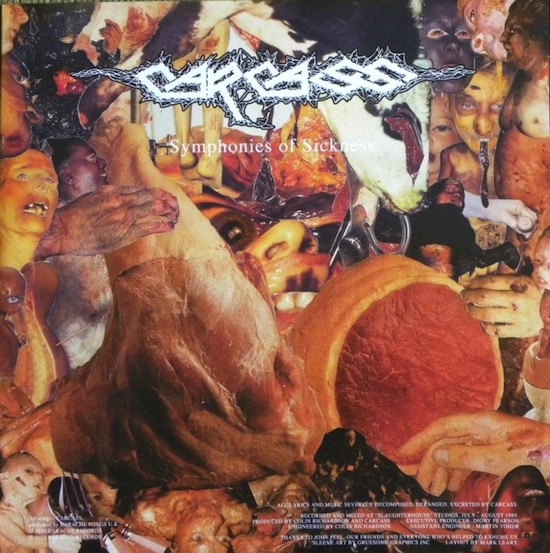Lyrical moments – turns of phrase, one line out of many – are among the more underrated moments in music with vocals. It’s not so much the lyric as a whole, or the performance as a whole either, as it is just the right words for the right moment. If the performance sells it, even better; it can sometimes transforms simple doggerel or generic sentiments, but when the line or moment is a great one, even better. For over two decades now, as I’ve continued to experience and learn about more music, and work around my own way of ‘hearing’ the music more than the words to make sure that great moments don’t slip by, one has always been around. It never fails to raise a smile for me. It’s so simple, and so perfect. On Carcass’s second full album, Symphonies Of Sickness, now reaching its twenty-fifth anniversary, there’s a song called ‘Empathological Necroticism’, and in the middle of a general list of various issues with smashed limbs and bodily disruption, bassist Jeff Walker shrieks “Life is hard as a mortuary technician!” Because the thing is, he’s right. Why wouldn’t it be?
Looking back on Carcass’s time almost leaves a listener in awe. Most bands could never have pulled off exactly what they did – have a key member participate in a separate epochal recording, with guitarist and founding member Bill Steer’s sidelong turn on Napalm Death’s Scum, then establish their own identity more clearly, break through in their own right following a roughly recorded debut with Symphonies Of Sickness, progress further towards the distinctly different and equally awe-inspiring Heartwork in 1992, wind down after a haphazard major label experience, then not only come back years later with new live work but some years later yet another masterclass album in the form of last year’s Surgical Steel. Most bands in any field would be lucky to nail one key song, let alone one key album, but releasing three can’t-be-ignored albums over the course of twenty five years, without which death metal – and metal overall – would just seem different otherwise, is one of those things you can’t help but feel amazed by. Talking about one of them alone is a hard task enough, but when you’ve lived with an album for a quarter of a century, one can try.
Earache reissued all the original Carcass albums a while back with documentaries for each – and posted them online, so you can and should watch the one for those earliest days, as well as the rest of them. Seeing all that is fun for me because I think back to how I first heard them and how there was just a little random mystery going on. In the late 80s and early 90s, Earache was distributed by a US label called Relativity, a slightly Anglophilic outfit that seemed to have some sort of relationship to the Columbia/Sony label in turn – whatever the exact explanation, they got a fair amount of the catalogue out there, and it was due to a piece in the LA Weekly that led me to pick up the combined CD of Symphonies and most of the debut, Reek of Putrefaction. I knew something about the Napalm Death connection, had heard about ‘grindcore’ as a term, but that was really about it, with me not following much metal press as such, but being friends with a number of out-and-out metal fiends (in some cases to the present day) who clued me in just a bit further.
All I really knew, though, was that when I first heard it, I laughed a lot – not AT them, by any means, but with them. It was so ridiculously fun. A high-speed, crazed romp. I thought I knew something about fast metal thanks to thrash and the Big Four in America, but this felt even more insane. I don’t know if I was immediately a fan for life at that stage, but here I am now and that initial feeling definitely had something to do with it — and still does, all this time later. For all the death, dismemberment and heaven knows what else on the album, literally on the sleeve itself, Symphonies makes me feel alive.
One thing that’s immediately appealing about Symphonies Of Sickness is exactly what it isn’t – namely Reek Of Putrefaction, recorded in a near blind two day rush, and where the band started before. A common complaint voiced these days in metal circles is that extremity, ugliness and aural grime has become something pitched between laziness and total lack of surprise, not to mention dynamics. It’s not all that far removed from a similar 80s-UK-artists-twist-the-world action/reaction, when Alan Moore and others relentlessly questioned and subverted superhero paradigms only to inadvertantly introduce what’s been termed ‘grimdark’ as the ONLY way to go, where Batman could never be seen doing a Batusi because he’s too busy being angry. Carcass were hardly the first act to introduce an aesthetic by accident in metal – look at the early releases by Venom and Hellhammer, among many others, for proof – and in Scandinavia the incipient black metal scene was about to demonstrate it again. But while Carcass now appreciate what they did with a distance, at the time they weren’t content to simply stay there.
From the start, with the low murmur, clipped riffs and chopping strings on ‘Reek of Putrefaction’ itself, Symphonies sounded cleaner, more open, and just a little more memorable than Reek the album did. That earlier record was a fantastic rush and still is, but it’s little wonder that the band didn’t want to repeat the experience in terms of recording quality – and that already was a good sign: a band that didn’t want to simply rest on its laurels, to introduce a sound and then stop. ‘Reek’ starts like a slow but sure warmup, builds and builds, gets to its truly heavy and brutal core riff and then it is gone – everything may be a total blur when it finally happens, but that’s only if you let yourself hear it as one. Hear it as a shit-hot and completely in the pocket set of performers just bringing it note for note, it’s something else again.
Steer’s riffs in particular show that Carcass could bring as much power to metal as any other act. It’s a brutish fierceness that already had its roots from throughout the 1980s, but here it feels constantly assured too, stirring and strong instead of simply foisted on an audience, as the solo on ‘Cadaveric Incubator Of Endoparasites’ shows among others. Walker’s low end work both matches and contrasts what Steer’s up to, ensuring that whenever they break from the rampage to let sweeping, near majestic moments in, it never feels out of place from the overall aesthetic. Then there’s Ken Owen on drums, no less essential and equally balanced between the frenetic and the fixedly controlled. At plenty of moments he drops away, stops entirely, snaps back into place, turns the blast beats and hits into something that has its own shifting set of variations, not simply one moment over and over again, not when he quickly adds fills or turn cymbals into textures of further sound. When Owen starts everything off on ‘Ruptured In Purulence’, steady, clear and letting first massive riffs then completely distorted vocals step in, he remains more than a heartbeat, he’s setting the whole tone, and it’s his brisk cymbal hits that signal the shift to another total rampage and explosion.
The band members themselves, referring to the documentary linked earlier, think of these days as before they were fully proficient, but what’s important is hearing that sense of proficiency being brought forward, that they weren’t simply a one trick pony. And turning back to the lyrics in full, that was more than a trick too – it would have been one thing to simply be a recitation of medical procedures or conditions, however much a lot of the lyrics had just that at their core. But there’s both humor and a sense of performance throughout – Walker’s dryly hoarse rasps and screams might not seem like that, but the whole point of that delivery is its theatricality, and by not delivering so many insanely over the top scenarios as either dead serious recitation or sniggering red-nose-wearing wackiness, the whole becomes its own inspired niche. (Catch Walker in that documentary talking about doing something that wasn’t simply sword-and-sorcery epic metal fantasy – instead a kind of bizarro fantasy of a different kind – and you get a sense about how important that approach was to both band and performer.)
So songtitles like ‘Crepitating Bowel Erosion’ and ‘Excoriating Abdominal Emanation’, not to mention the original cover art, a delight of various bodies or pieces thereof, human or otherwise, in full photographic gore arranged in a collage, both dare you to take everything seriously and to do so with a wicked smile. It’s art that’s meant to be ugly without apology but like so much in music that pursues an extreme, the melodrama breaks down when you look at it hard. Much was made about the band supposedly being vegetarian medical students and the like at the time, almost as if that was the only way to explain why they’d be writing and doing the kind of approach they did, an attempt to introduce a formal logic to an inspired flash. But when you’re dealing with songs about digging up dead bodies in order to eat them or talking about your guts falling apart and out of your body, and then doing so in a way that’s near impossible to tell unless you read the carefully laid out lyric sheets, a little bit of Occam’s razor applies, the same rule that meant Alice Cooper wasn’t actually staging his death night after night and that Ozzy Osbourne was right to say black magic was all about chocolates.
And again, the same logic that life would be hard as a mortuary technician, but someone’s got to do the job. Carcass helped invent and codify a world of metal as near unreadable logo, grotesqueries in art and words and high speed mania, but they reached a prime moment with Symphonies of Sickness and then looked beyond it and kept going, a signpost but not an endpoint. It’s why the album lasts, why it still gives a nervously intense but still giddy thrill, and why it damn well rocks, period.



